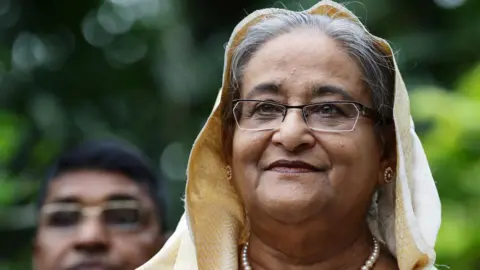From Pro-Democracy Icon to Ruthless Autocrat: Sheikh Hasina's Political Downfall

Sheikh Hasina Wazed, Bangladesh's longest-serving prime minister, began her political journey as a symbol of pro-democracy movements. However, after 15 years in power, her regime faced mass protests led by students in 2024 that purportedly originated from a demand to abolish civil service job quotas but quickly evolved into widespread anti-government sentiments. Amidst escalated unrest, Hasina fled to India in August 2024, where she entered self-imposed exile.
On November 17, 2025, a special tribunal in Dhaka sentenced her to death after finding her guilty of crimes against humanity linked to a violent crackdown on protesters that resulted in the deaths of up to 1,400 individuals. UN reports noted that security forces acted under her orders, marking this incident as one of the country’s bloodiest periods since its independence. Many critics accuse her of transitioning from a pro-democracy leader to an autocrat who suppressed dissent mercilessly.
During her tenure, Hasina's government was credited with significant economic advancements, notably in the garment industry, which significantly contributed to the country's exports. However, reports emerged detailing systematic oppression against opposition figures and dissenters, including politically motivated arrests, enforced disappearances, and extra-judicial killings.
As her regime tightened its grip, reports of corruption and mismanagement overshadowed economic success, which benefitted only a selective few within her political circle. Following her conviction, Hasina dismissed the tribunal as politically motivated, labeling it as a "kangaroo court" designed to distract from the current government’s failures.
This dramatic turn in Bangladeshi politics illustrates the severe consequences of political power mismanagement and highlights the essential struggle for democracy within the nation. Following her ousting, a new chapter for Bangladesh unfolds as the nation grapples with its turbulent political legacy.


















